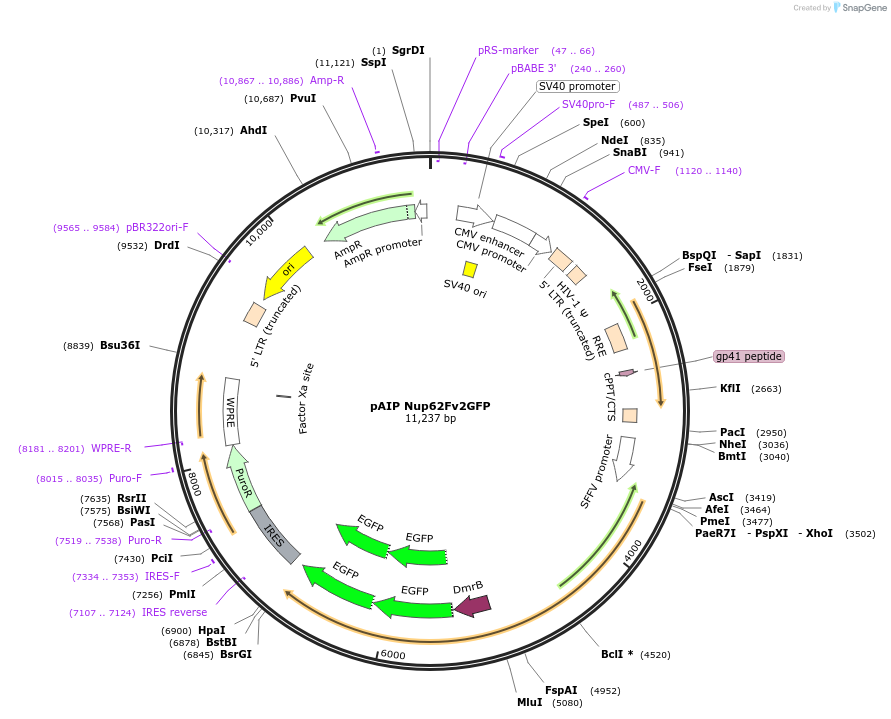pAIP Nup62Fv2GFP
(Plasmid
#139684)
-
PurposeNup62 dimerization construct fused to 2 copies of GFP under an SFFV promoter
-
Depositing Lab
-
Sequence Information
Ordering
| Item | Catalog # | Description | Quantity | Price (USD) | |
|---|---|---|---|---|---|
| Plasmid | 139684 | Standard format: Plasmid sent in bacteria as agar stab | 1 | $85 | |
Backbone
-
Vector backbonepAIP
-
Backbone manufacturerJeremy Luban Addgene plasmid 74171
- Backbone size w/o insert (bp) 7826
- Total vector size (bp) 11194
-
Vector typeMammalian Expression, Lentiviral
-
Selectable markersPuromycin
Growth in Bacteria
-
Bacterial Resistance(s)Ampicillin, 100 μg/mL
-
Growth Temperature37°C
-
Growth Strain(s)NEB Stable
-
Copy numberHigh Copy
Gene/Insert
-
Gene/Insert nameNup62
-
SpeciesH. sapiens (human)
-
Insert Size (bp)3342
-
GenBank IDBC003663.2 23636
-
Entrez GeneNUP62 (a.k.a. IBSN, SNDI, p62)
- Promoter SFFV
-
Tags
/ Fusion Proteins
- Dimerization domain FKBP (C terminal on insert)
- 2 copies of GFP (C terminal on insert)
Cloning Information
- Cloning method Restriction Enzyme
- 5′ cloning site Xho1 (not destroyed)
- 3′ cloning site Hpa1 (not destroyed)
- 5′ sequencing primer SFFV Forward
- 3′ sequencing primer IRES rev (Common Sequencing Primers)
Resource Information
-
Supplemental Documents
Terms and Licenses
-
Academic/Nonprofit Terms
-
Industry Terms
- Not Available to Industry
Trademarks:
- Zeocin® is an InvivoGen trademark.
These plasmids were created by your colleagues. Please acknowledge the Principal Investigator, cite the article in which the plasmids were described, and include Addgene in the Materials and Methods of your future publications.
-
For your Materials & Methods section:
pAIP Nup62Fv2GFP was a gift from Edward Campbell (Addgene plasmid # 139684 ; http://n2t.net/addgene:139684 ; RRID:Addgene_139684) -
For your References section:
Nuclear pore blockade reveals that HIV-1 completes reverse transcription and uncoating in the nucleus. Dharan A, Bachmann N, Talley S, Zwikelmaier V, Campbell EM. Nat Microbiol. 2020 Jun 1. pii: 10.1038/s41564-020-0735-8. doi: 10.1038/s41564-020-0735-8. 10.1038/s41564-020-0735-8 PubMed 32483230





